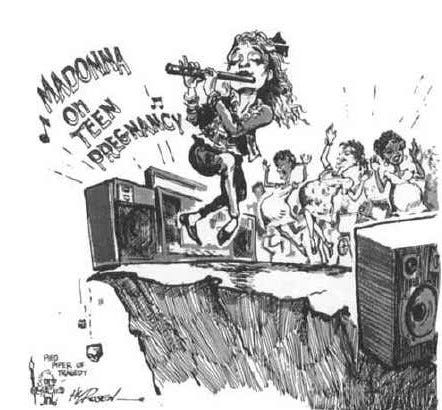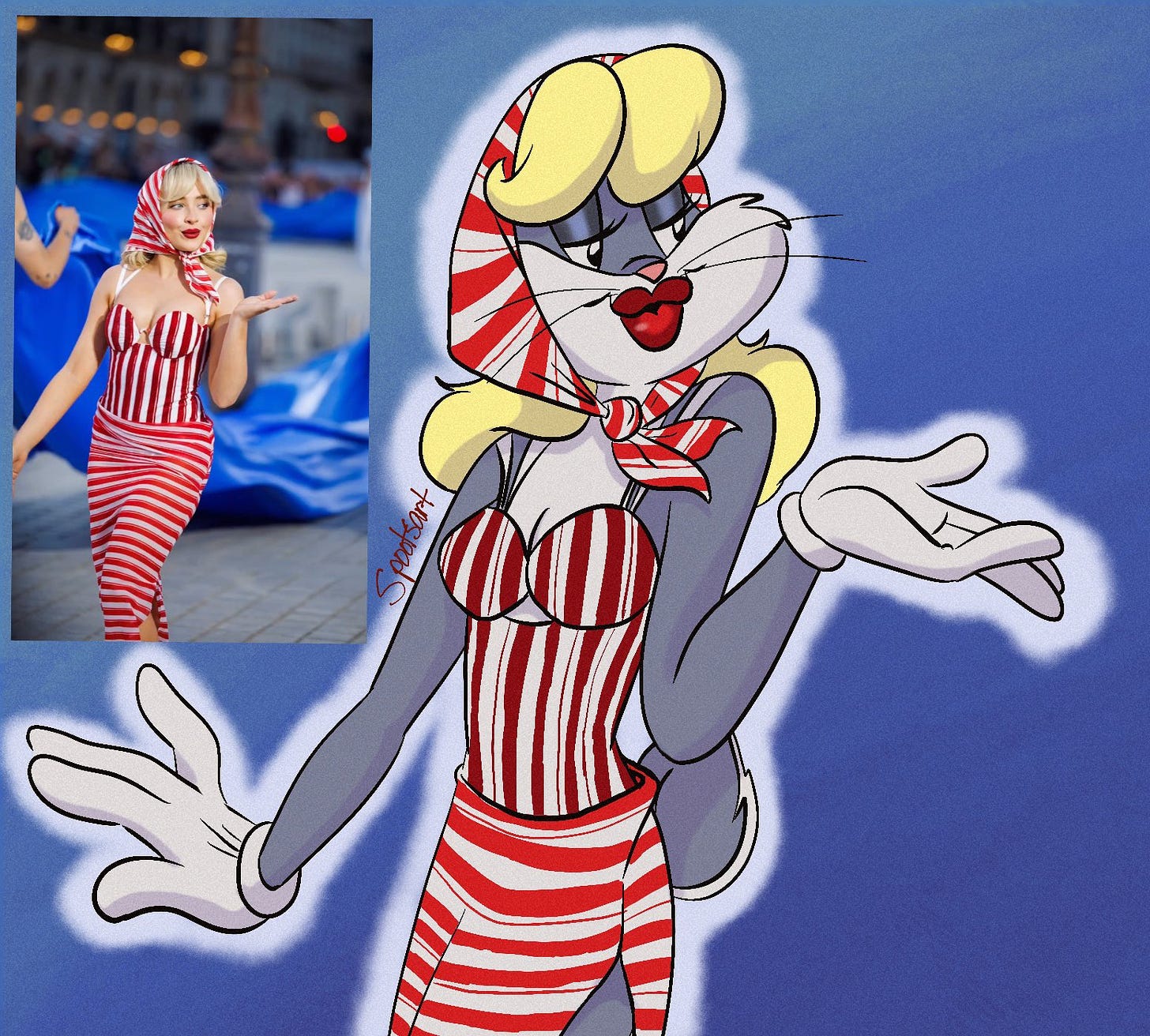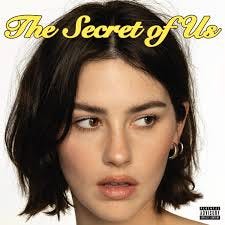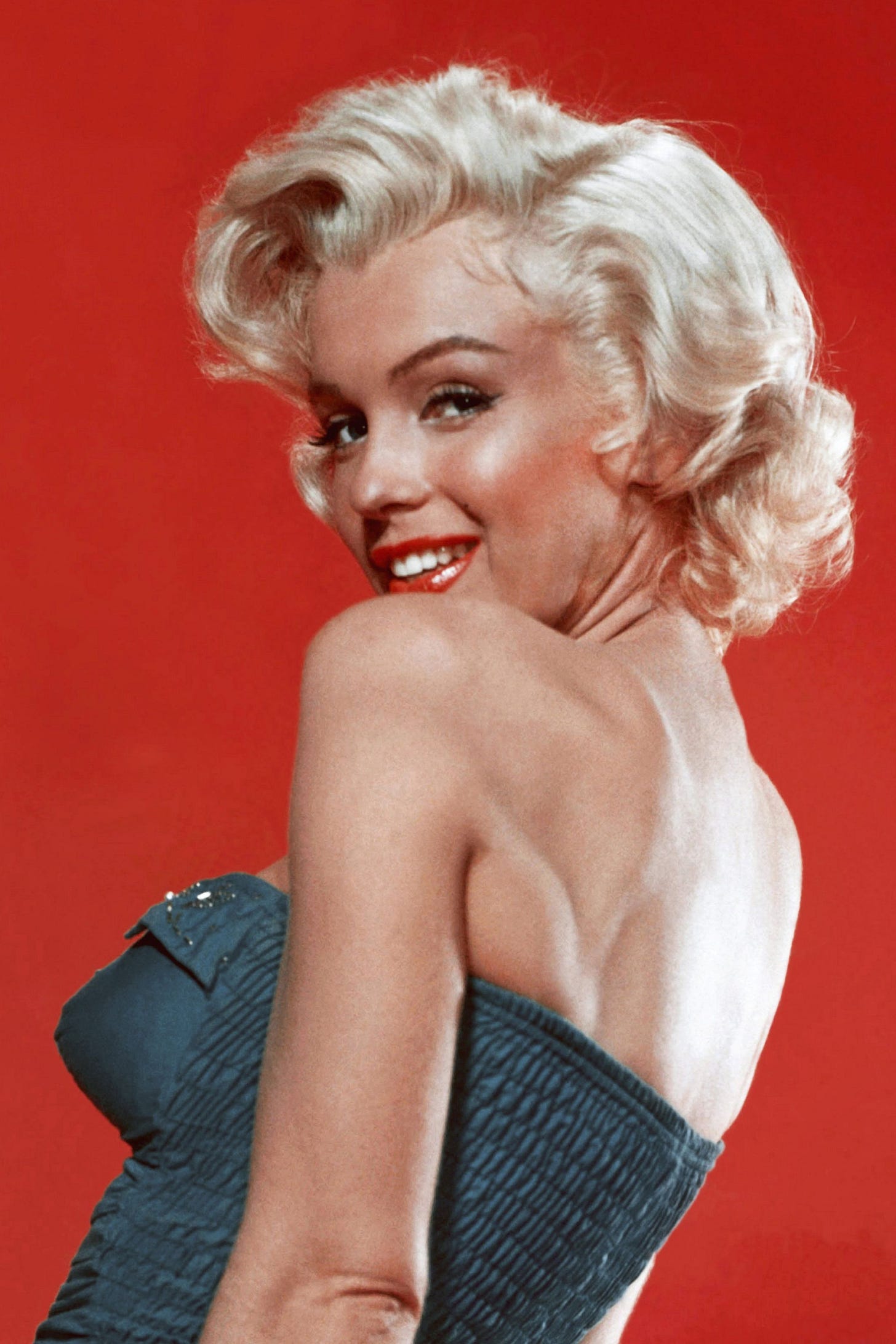As a mother to teen daughters, I'm not that concerned about Sabrina Carpenter's influence (...but I am about Gracie Abrams)
As far as complexes go, I fear the Madonna more than I fear the whore.
I have two teenage daughters. Every couple months the algorithmic gods present me with articles telling me I should be afraid of Sabrina Carpenter’s influence on my teenage daughters.

She acts out vulgar sex positions on stage in front of children I’m told.
Prancing about in pink nightgowns and pigtails, she panders to a pedophilic pipe dream I’m told.
She’s “glorifying women’s dehumanization” I’m told.
She’s the poster child for Bimbo Feminism I’m told.
She dresses like Bugs Bunny trying to seduce Elmer Fudd.
She has unapologetically sold her life over to the porn-rattled male gaze for profit I’m told.
These arguments are not unfounded.
This photo shoot for W magazine where Carpenter mimics Lolita from the movie based off the book where a 37 year old man falls in love with and abuses a 12 year old girl—is particularly concerning.
Yikes.
That said…
Both my daughters sing along nary missing a word when Carpenter’s songs Espresso or Please Please Please play, and I gotta say, of all the things I’m concerned about having a negative influence on my daughters, Sabrina Carpenter does not rank high on that list.
I don’t get nervous when my girls listen to her.
Some nerves do arise, however, when my girls listen to a far less controversial musician, Gracie Abrams.

Last year I drove four hours to go to the Gracie Abrams concert with my daughter.
Stuffed like sardines in a standing-only warehouse smelling of overworked fog machines, a maternal urge came over me to protect my girl, the thousands of young girls in attendance and Abrams herself from the I-am-not-ok-unless-a-man-loves me messages in just about every song.
Where Carpenter wears her sexuality on her baby-girl-ruffled sleeves, Gracie bottles hers up, stores it in the space behind her ear where she coyly exposes it to the boy of her choosing.
Once chosen, she asks nicely if she can please sit quietly in the corner taking up as little of his time, space and energy as possible. Oh too much? She can be smaller. Too loud? She can be quieter. She’ll be cool, she’ll be chill, just whatever you do, please don’t leave her.
Two of her biggest hits are “I love you I’m sorry” and “I miss you I’m sorry.”
Please God, may neither of those sentences ever escape my girls’ lips. Or any of these lyrics either:
“I burn for you and you don’t even know my name. If you asked me to, I’d give up everything to be close to you.”
“Break my heart and start a fire, just let me be close to you.” - Close to you
“I need nothing.” - Risk
“I miss fighting in your old apartment, breaking dishes when you’re disappointed. I still love you, I’m sorry.” - I love you I’m sorry
“I know I should hate you… I’d bend back if you left the door open.” - I should hate you
“Got me where you want me, in your palm… All my friends tried to stop me wanting you. But I was never meant to listen.” - Felt Good About You
“I had a backbone made of glass, and then it broke. Now I stay up and wait here by the phone.” - Let it Happen
“Sorry that I can’t believe that anybody ever really starts to fall in love with me.” - I miss you I’m sorry
“I was your floorboard.” - Gave You I
“I would do whatever you wanted.”
“I don’t care if you’ve changed. I don’t even have to stay.”
“How could I think that all that I gave you was enough? Every time I get too close I just go mess it up.” - Let it Happen
During the concert I started harboring fantasies of locking Gracie in self-confidence camp—wrapping her in warm blankets, feeding her cheese and fruit and reading her bell hooks and Glennon Doyle until her late 30s.
It must be said that in many ways- Abrams and Carpenter aren’t all that different. The ratio of their songs about attracting boys to their songs about literally anything else is… disheartening. Both have more than a few cringey anthems dedicated to smearing their boyfriend’s ex-girlfriend. Both fit the “white American soft girl1” mold certainly.
But while both singers have seemingly dedicated themselves to winning over the male gaze (as is their right of passage as hot 20-something pop stars), Carpenter does so with a wink and a smirk, always having the upper hand. She’s in on it. Abrams on the other hand prostrates herself in the fetal position at the feet of men. Far from having the upper hand, she turns herself into putty in their hand—willing herself to be shaped into whatever form they want her to take.
As a mother, the prostrated putty scares me much more than the brazen sexuality.
Weirdly though, the apologetic fetal position is so much more socially acceptable than the sex positions.
I don’t know of any other mothers who have ever thought twice about their daughters listening to Abrams. She’s basically a mother’s dream- She doesn’t cuss. She’s not twerking on stage with her male back up dancers. She’s sweet. She stopped our concert seven times mid song to check on audience members, worried about people passing out. She thanked her fans 5000 times during the show. She doesn’t give any real cause for concern.
I may be the only mama bear whose hackles are raised by Gracie Abrams. If others are out there, they are certainly not writing internet articles about it. While I’ve come across hundreds of articles outraged by Carpenter, I haven’t come across any outraged parents posting about Abrams.
Abrams’s message is so very, very normal. Exactly what we’d expect a young 20 something female to be thinking: Please love me. Please come back. I’m so sorry I have needs. I’ll have fewer, just please let me please you.
Yawn. Ho hum. What else would a young woman be singing about?
But is Abrams any more shielded from heartbreak or abuse than Carpenter? Which teen girls are safer- those who follow after Carpenter’s example or Abrams’s?
For all our modern feminism, demonizing the whore has held steady for 2000 years
Loathe as I am to ever give Sigmund Freud any airtime (he took up far more than his fair share last century), his Madonna-whore complex is a fitting model here. It states that men either see women as saintly Madonnas or as debased whores.

The women in the Bible are all either virginal motherly saints— Mary, Rachel, Ruth, Martha, Sarah. Or they are harlots— Jezebel, Delilah, Bathsheba, Potipher’s wife. Your utility as a woman is either to offer a man care-taking or offer a man sexual satisfaction. Be a wife or be a concubine. End of life choices.
And since Biblical times, women who choose to own the role of whore will always, always be ridiculed.
The reason for the ridicule may change— she’s a bad influence or a bad Christian or a bad feminist—but the criticism itself has remained constant for the past dozen centuries.
No one mourns the wicked.
Carpenter is but one in a long, long, long line of condemned loose women who must pay for their sins of flaunting their sexuality by way of public crucifixion:
Marilyn Monroe
Parents and feminists alike were worried about the influence of Marilyn Monroe. Film critic Molly Haskell said “Women hated Marilyn for catering so shamelessly to a false, regressive, childish and detached idea of sexuality.” Haskell noted that Monroe’s “portrayal of passive female sexuality was seen as a threat to the evolving roles of women in society.”
That sounds familiar.
Madonna
Madonna's image and performances led to widespread moral panic. When Madonna came out with “Papa Don’t Preach” in 1986, she was widely accused of “encouraging teenage pregnancy.”

Political commentator Gil Troy said Madonna was “fostering a generation of sluts.”
Not to leave the feminists out, Adam Sexton wrote that “she is teaching her young female fans to see themselves as men would see them; that is, she is hailing them as feminine subjects within patriarchy and as such is an agent of patriarchal hegemony.”
That sounds familiar.
Lil’ Kim
Lil’ Kim’s debut album Hard Core sparked significant controversy over its explicit sexual content. (Never mind that men in the genre had been singing far more risqué lyrics for years without pushback.)
Unlike Madonna or Monroe, Lil’ Kim had to fight both racism and sexism as people came for her label Warner Bros Records accusing them of producing Lil’ Kim’s “filthy gangsta porno rap.”
A 1997 episode of The Rolonda Watts show aired discussing the question, “Is Lil’ Kim sexualizing our children?”
That sounds familiar.
While the “whore” herself changes, it is remarkable how similar each decade’s reaction to “the whore” is.
Feminism wants female celebrities to be free sexual agents, but not overly-dedicate herself to the male gaze- a walk on the edge of a needle I do not envy.
Confusing self-erasure with virtue
Where “the whore” is condemned- the “Madonna” (not to be confused with Madonna) on the other hand is praised, hailed the good girl and upheld as a good example to teen girls. The Madonna is well liked for being sweet, humble and respectable.
The Madonna doesn’t shimmy about in her skinnies for attention. She gets married, has kids and lives happily ever after.
So the story goes.
But the truth is, the Madonnas are just as likely to be chewed up and spat out by the patriarchy as the whores are. Just with more admiration and far less blame when their stories turn tragic.
But they do often wind up just as tragic:
Debbie Reynolds
Singing in the Rain actress Debbie Reynolds was crowned “America’s sweetheart.” She was about as good girl as good girl gets.
Her childhood friend wrote of her, “I say this in all sincerity. Debbie can serve as an inspiration to all young American womanhood… she has a realistic sense of values based on faith, love, work, and money. Life has been kind to her because she has been kind to life. She's a young woman with a conscience, which is something rare in Hollywood actresses.”
She’s not like those other Hollywood whores.
Reynolds married actor Eddie Fisher when she was 23. Four years into their marriage Debbie was thrown into the middle of a massive public scandal when it came out that Eddie was having an affair with Debbie’s best friend Elizabeth Taylor.
Debbie’s second husband was a rich businessman who ended up swindling Debbie out of over $100 million dollars to cover his gambling addiction and bad investments.
Her third husband ended up being a combination of the first two—he both publicly cheated on her and swindled her out of millions to cover his addictions and poor investments.
Her daughter, actress Carrie Fisher, said of her mother, “Always, she is who she is: a good person, a kind person — which would be a fine thing if these were qualities consistently rewarded. But as most of us know, they are not.”
Marie Osmond
Brought up in the picture-perfect Mormon family, Marie’s life was supposed to be the good-girl fairy tale living happily ever after with her prince.
Instead, she was sexually abused in her youth, she’s been married three times, has eight children and has struggled intensely with depression for most of her life.
In her book Behind the Smile she explains that after the birth of her son Matthew she felt like she was “fading away minute by minute.”
She suffered from years of regular panic attacks, fatigue, neck pain and suicidal ideations.
She wrote, “In my life, the normally positive quality of putting others first resulted in long-term negative effects because it was out of balance.”
Whitney Houston
Raised a devout Baptist, Houston got her singing start young performing in churches. She was perfectly cast as the beautiful, dutiful, respectable preacher’s wife in the movie The Preacher’s Wife.
Unfortunately her life unfolded far differently than the good girl script promises. After dating for three years, Houston married fellow singer Bobby Brown, who was later charged with battery and assault against Houston.
Point being, it’s not as if playing the role of the good girl “Madonna” shields you in any way from patriarchal tragedy.
While the “whores” are consistently warned that their life trajectory will bring heartache and abuse—the Madonnas are just as likely to face both but receive no warning.
The danger of the Madonna is that they do everything right and still lose. They are praised for the very things that erase them- their self sacrifice, chronic accommodation, keeping themselves small, not complaining, conforming to society’s expectations.
Their trap is stickier because it’s disguised by societal approval. You don’t realize it’s a trap at all until you’re already stuck in the orbit of a life lived for someone else.
This is the quiet devastation we encourage our daughters to aim for.
60 percent of couples married between the age of 20 -25 will end in divorce. Only 8% of marriages make it to their golden anniversary.
As someone who married at age 23 and became a stay-at-home mom—whose retirement plan hinged on being one of these statistical minorities—no one ever warned me of those odds.
Instead each and every week of my youth—at church and at home— I was warned of the dangers of being a whore. It was the single most persistent and urgent message I received as a teen girl—whatever you do, do not have sex. Do not tempt boys. Do not be easy. Do not be a slut.
Girls who got pregnant out of wedlock, Jezebel, Delilah—these were cautionary tales told with serious foreboding.
Mary, Rachel, Ruth—these virginal Madonnas were who I was striving to be.
Instead I was encouraged to erase more, more and more of myself. Praise followed every part of myself I made disappear. Good, go harder- really dig in there erasing your identity, your desires, your needs and wants.
I had the lyrics to a song called “A Window to His Love” glued to the inside of multiple journals from girlhood into adulthood.
Some of those lyrics include:
“I want to stand so straight and tall, that you won't notice me at all… With each passing day, I want to fade away 'Till only He can be seen And I become a window to His love…. With each passing year, I want to disappear.”
Self-erasure wasn’t just encouraged, it was my express goal.
I don’t want this for my daughters.
Ideally there would be other choices other than just the Madonna or the whore. Both those roles are side characters to a man’s starring role, and I want my daughters to be the main character in their lives.
I don’t want any woman, let alone my daughters, to have to choose between the ancient archetypes of the Madonna or the whore.
But if I did have to choose, honestly I’d prefer the whore.
If you’re going to be screwed by the patriarchy either way, may as well go with the option where orgasms are more likely.
Do you enjoy thinking about and discussing all things patriarchy and feminism?? Cool me too. Come discuss with me and the Matriarchal Blessing community by becoming a paying subscriber. Our next gathering will be in July and we will be discussing Ruth Whippman’s book BoyMom.
Alternatively, you could also just pay me for my work just cause, that is also very cool and very appreciated! Thank you!
“White American “soft girls” give me pause. For a demographic of women which, historically, have not raised their own children, have not performed the majority of domestic labor, and have been kept out of the public sphere, it’s logical to meet the overwhelm of modern, feminist life with a desire for return. The boredom and plight of their ancestors has been rebranded into a life of leisure; of paid-for pilates, almond Gel X nails, and endless highlight touch-ups. A life of tortured silence now appears peaceful in contrast to the financial, social, political, and emotional struggle of being a working woman in 2024—a double-bind working-class and BIPOC women have been navigating for centuries.” - Jade Hurley





![Sabrina Carpenter photographed by Zoë Ghertner for W Magazine [September 2024] : r/popculturechat Sabrina Carpenter photographed by Zoë Ghertner for W Magazine [September 2024] : r/popculturechat](https://substackcdn.com/image/fetch/$s_!zpa6!,w_1456,c_limit,f_auto,q_auto:good,fl_progressive:steep/https%3A%2F%2Fsubstack-post-media.s3.amazonaws.com%2Fpublic%2Fimages%2F28ee36ca-dea5-4ac4-9a12-09ab255ee4d9_1280x1280.jpeg)






I loved this article on the title alone- and the rest didn’t disappoint! Britney Spears is an excellent example of a young woman walking that needle’s edge being everything the patriarchy wants (virginal and hot and talented) and still got completely screwed over. There’s no winning, so fuck it. Don’t erase yourself. Seize your sexuality and independence with a cheeky wink a la Sabrina Carpenter. And if you can add in some Pink or Rhianna level of zero fucks go piss into the wind attitude, go for it.
Good piece. Sometimes I think that the second wave feminist generation, those of us born between the 60s and the '90s, tried to fight against this dichotomy. But the younger generation, not sure of millennials but definitely Generation Z, seem to be deciding just to step outside of it. Conservatives wonder why so many young people are gender expansive, but it's not at all confusing when you look at the gender roles that they are presented with. They have choices that they get to make simply because so many of them are making them all at once. They are making up their own new spectrum and it's scaring the bejeezus out of people who have based their own self-worth keeping the status quo.